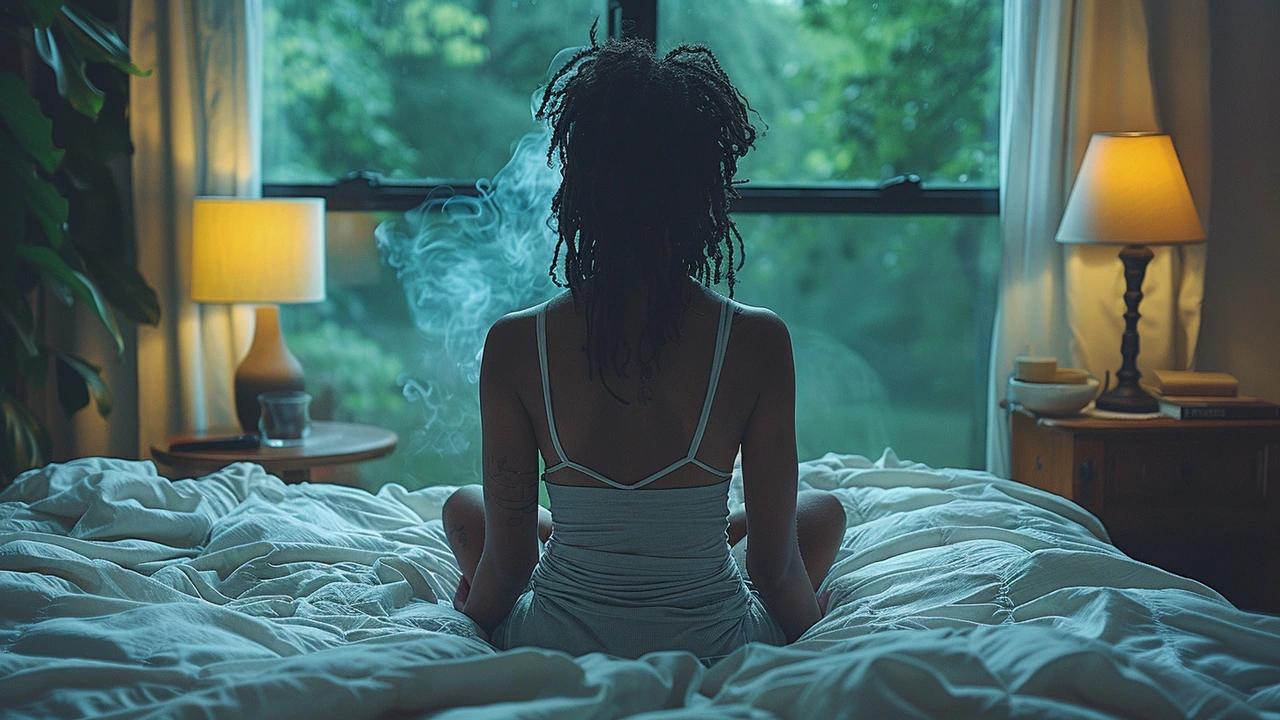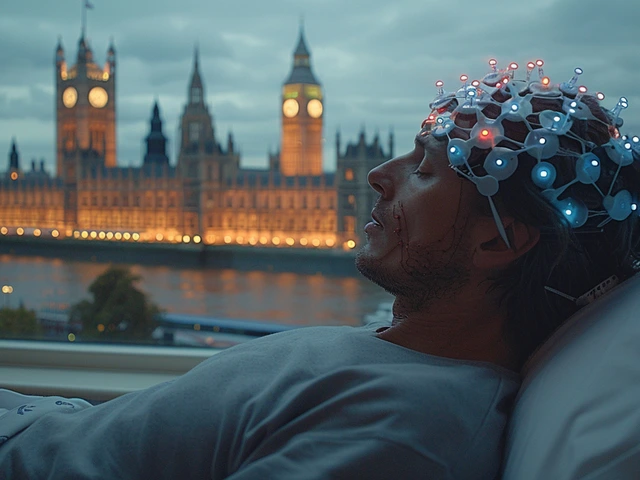Do you often find yourself tossing and turning at night, unable to drift into a peaceful slumber? If so, you’re not alone. Millions of people struggle with sleep issues, which can have a profound impact on both physical and mental well-being. Fortunately, there’s a natural and simple solution that can help—relaxation techniques.
Relaxation techniques are methods designed to help reduce stress and calm the mind. They're easy to incorporate into your daily routine and can be life-changing when it comes to improving sleep quality. By taking the time to unwind and prepare your body for rest, you can enjoy deeper, more restorative sleep.
In this article, we explore various relaxation techniques, including deep breathing exercises, progressive muscle relaxation, and mindfulness meditation. We’ll also discuss the science behind why these methods are so effective and how they can be integrated into a nightly routine to maximize their benefits.
- Understanding Relaxation Techniques
- Effective Practices for Better Sleep
- Scientific Benefits of Relaxation
- Creating a Nightly Routine
Understanding Relaxation Techniques
In today’s fast-paced world, the concept of relaxation can sometimes feel elusive. The constant hustle and bustle, combined with day-to-day stresses, can significantly impact our ability to unwind and sleep well at night. This is where relaxation techniques come into play. But what exactly are these techniques, and how do they benefit us?
Relaxation techniques are methods designed specifically to help individuals reduce stress, promote calmness, and prepare the body and mind for rest. They can include a range of practices, from deep breathing exercises to more structured approaches like mindfulness meditation. Interestingly, these techniques are rooted in ancient traditions but have been validated by modern science for their effectiveness. For instance, deep breathing exercises have been shown to lower cortisol levels, the body's primary stress hormone, making it easier to fall asleep.
One popular relaxation method is progressive muscle relaxation (PMR). This technique involves tensing and then gradually relaxing different muscle groups in the body. By doing this, you can release built-up tension and create a sense of overall relaxation. According to the National Sleep Foundation, PMR can help reduce physical symptoms of stress and anxiety, which are often culprits of sleepless nights.
"Mindfulness meditation is another powerful tool for relaxation," says Dr. Herbert Benson, professor of medicine at Harvard Medical School. "It helps to quiet the mind and break the train of everyday thoughts. This change in the brain activity helps prepare the mind and body for restful sleep."
While these techniques might seem simple, their impact is profound. Studies have shown that people who regularly practice relaxation techniques experience better sleep quality, lower levels of fatigue, and improved overall well-being. It’s no wonder that these methods are gaining popularity not just among those struggling with sleep, but also among individuals looking to improve their general health.
Another effective relaxation technique is visualization, also known as guided imagery. This practice involves closing your eyes and imagining a peaceful scene, such as a quiet beach or a serene forest. By focusing on the details of this tranquil setting, you can shift your mind away from stressful thoughts and create a calming mental space. The American Psychological Association highlights visualization as a valuable method for reducing anxiety and enhancing sleep.
Incorporating these techniques into your nightly routine doesn’t require a significant time investment, but consistency is key. Whether it's spending a few minutes on deep breathing exercises or practicing mindfulness meditation before bed, these small changes can lead to significant improvements in sleep quality. As you explore different relaxation methods, pay attention to how your body and mind respond, and stick with what works best for you.
Effective Practices for Better Sleep
Achieving better sleep often begins with adopting effective relaxation techniques. These methods can help quiet your mind, release the tension held in your body, and create an optimal environment for sleep. One simple yet powerful practice is deep breathing exercises. Deep breathing can help activate your parasympathetic nervous system, calming your mind and lowering your heart rate. To practice deep breathing, sit or lie down in a comfortable position, inhale deeply through your nose for a count of four, hold the breath for a count of seven, then exhale slowly through your mouth for a count of eight. Repeat this cycle a few times.
Progressive muscle relaxation is another effective tool to unwind. This technique involves sequentially tensing and then relaxing different muscle groups in your body. Start at your toes and work your way up to your head. As you relax each muscle group, focus on the sensation of releasing tension. This helps to enhance body awareness and can significantly reduce physical stress, setting the stage for restful sleep.
Mindfulness meditation has also been shown to improve sleep quality. By practicing mindfulness, you learn to focus on the present moment, letting go of worries and distractions. Find a quiet space, sit comfortably, and close your eyes. Pay attention to your breath and the sensations in your body. If your mind wanders, gently bring your focus back to your breath. Regular practice can help reduce anxiety and train your brain to settle into a more relaxed state. As Jon Kabat-Zinn, a pioneer in mindfulness research, once said,
“Mindfulness is paying attention in a particular way: on purpose, in the present moment, and non-judgmentally.”
Integrating aromatherapy into your bedtime routine can also support relaxation. Certain scents, such as lavender, chamomile, and sandalwood, are known for their calming properties. You can use essential oils in a diffuser, add them to a warm bath, or apply them to a pillow. The gentle aroma can help signal your body that it's time to wind down and prepare for sleep.
Finally, creating a relaxing bedtime ritual is crucial for better sleep. Consistency helps train your body’s internal clock, making it easier to fall asleep and wake up at the same time each day. Start your routine an hour before bed by turning off electronic devices, dimming the lights, and engaging in calming activities like reading, gentle stretching, or listening to soothing music. These habits can set a peaceful tone for the night and enhance the quality of your sleep.
Scientific Benefits of Relaxation
Understanding how relaxation techniques positively impact our health can provide additional motivation to incorporate them into daily routines. Scientific research consistently shows that these practices go beyond just making us feel good—they actively improve our overall well-being, especially sleep quality.
One major way relaxation helps is by reducing the levels of cortisol, the stress hormone, in our bodies. High cortisol levels can lead to sleep disturbances, making it difficult to fall and stay asleep. Engaging in relaxation techniques such as deep breathing or meditation has been shown to significantly reduce cortisol levels, paving the way for more restorative sleep.
Dr. Herbert Benson, a pioneer in mind-body medicine, states, “Relaxation techniques activate the body's parasympathetic nervous system, which counteracts the stress response, promoting a state of calm and aiding in better sleep.”Studies published in reputable medical journals highlight that mindfulness meditation can increase melatonin production—a hormone responsible for regulating sleep-wake cycles. Increased melatonin levels facilitate *falling asleep* and staying asleep throughout the night.
Furthermore, relaxation techniques can lead to measurable changes in brain activity. For instance, activities like yoga and Tai Chi have been shown to increase alpha brain waves, which are associated with calm and relaxation. These brain waves are crucial for entering a restful state conducive to high-quality sleep.
Research also indicates that relaxation techniques can help mitigate symptoms of anxiety and depression, both of which are common sleep disrupters. By promoting mental health, these methods indirectly enhance sleep quality. A study conducted by the American Psychological Association found that participants who practiced relaxation techniques reported significant improvements in sleep latency and duration.
Interestingly, the benefits of relaxation aren't just anecdotal. A controlled study from Harvard Medical School showed that individuals who used progressive muscle relaxation before bedtime fell asleep quicker and had fewer nighttime awakenings compared to those who didn't use the technique. These findings highlight the practical implications and effectiveness of relaxation methods in improving sleep.
To sum up, the scientific community supports the integration of relaxation techniques as a viable means to improve sleep quality. Lowered cortisol levels, increased melatonin production, enhanced brain activity, and reduced anxiety and depression symptoms all contribute to this improvement. By embracing these practices, individuals can foster a deeper, more restorative sleep, leading to better health and well-being.
Creating a Nightly Routine
Establishing a nightly routine is a vital step toward achieving better sleep quality. Just like having a regular exercise regimen or a balanced diet, a consistent bedtime routine can greatly influence your sleep patterns. The key to a successful nightly routine lies in its predictability and consistency. By sending regular signals to your brain that it’s time to unwind, you can effectively prepare your body for rest.
The first step in creating a nightly routine involves setting a specific time for bed and wake-up. Your body’s circadian rhythm thrives on consistency, and maintaining a regular sleep schedule can aid in reinforcing this natural cycle. Aim to go to bed and wake up at the same times every day, even on weekends. This reinforces your body’s internal clock, making it easier to fall asleep and wake up naturally.
Next, consider incorporating relaxation techniques into your pre-sleep rituals. Activities such as deep breathing exercises, mindfulness meditation, or reading a book can help calm your mind and ease the transition into sleep. A study from the National Sleep Foundation found that individuals who practiced relaxation techniques before bed experienced improved sleep quality and woke up feeling more refreshed.
“A good laugh and a long sleep are the best cures in the doctor’s book.” — Irish ProverbMinimizing exposure to screens before bedtime is another crucial aspect. The blue light emitted by phones, computers, and televisions can interfere with melatonin production, the hormone that regulates sleep. Aim to power down electronic devices at least an hour before bed. Instead, opt for activities that promote relaxation, such as taking a warm bath or listening to soothing music.
Keeping your sleep environment conducive to rest is equally important. Ensure your bedroom is cool, dark, and quiet. Investing in a comfortable mattress and pillow can also make a significant difference. Environmental factors like these can enhance sleep quality and help you fall asleep faster.
Diet and exercise also play significant roles in your sleep routine. Try to avoid heavy or large meals within a few hours of bedtime. Caffeine and alcohol can also disrupt sleep, so it's best to limit them during the evening. Regular physical activity, meanwhile, can help you fall asleep quicker and enjoy deeper sleep. Just remember to avoid vigorous exercise close to bedtime, as it can have the opposite effect.
Here’s a simple nightly routine you can adopt:
- Set a consistent bedtime and wake-up time.
- Engage in relaxation techniques (deep breathing, meditation, or gentle yoga).
- Avoid screens and blue light exposure an hour before bed.
- Create a relaxing pre-sleep environment (dim lights, soothing music).
- Ensure your bedroom is cool, dark, and quiet.
- Avoid heavy meals, caffeine, and alcohol in the evening.
By establishing and adhering to a nightly routine, you create a clear signal for your body that it’s time to wind down. These consistent practices can help improve sleep quality, making you feel more rested and refreshed. The power of a routine is that it becomes second nature over time. The effort you put into creating a nightly routine will pay off, leading to better nights and brighter days.





